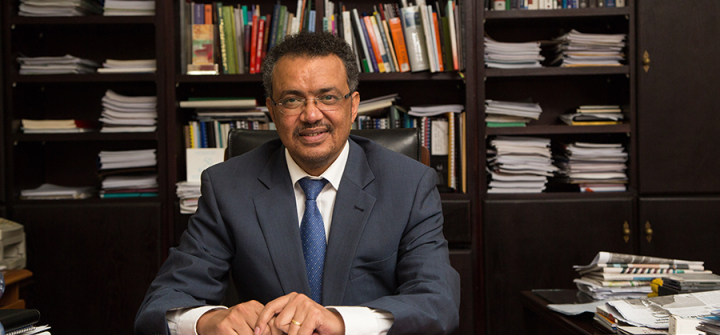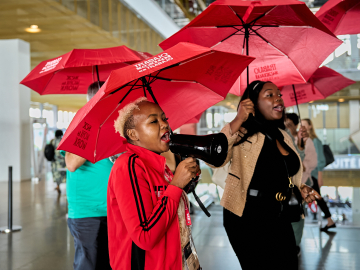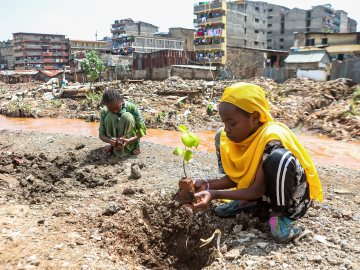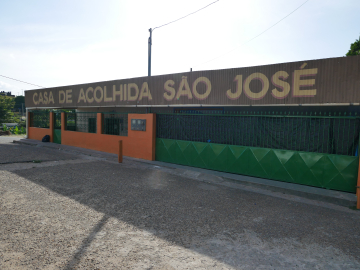Experience Over Geography: DG Candidate Tedros Adhanom’s Q&A, Part II
There’s never been a WHO Director-General from Africa. Some have argued it is time for an African to lead the organization. Though an obvious beneficiary of this line of thought, Tedros Adhanom Ghebreyesus says he should be elected because of his skills and his record as a former Minister of Health and Minister of Foreign Affairs of Ethiopia; chair of the Global Fund; and leadership of other organizations. “It is one thing to tell countries or organizations what they should do, and another to have lived it and done it yourself,” he says.
In this second part of GHN's Q&A, Tedros also responds to criticism of the Ethiopian government’s record on human rights and shares his thoughts on lessons learned from West Africa’s Ebola outbreak.
What do you think of the idea that it’s time for a DG from a low- or middle-income country? How important is this emphasis on geography as compared with the next DG’s experience and record?
It is true that Africa is among the two continents from where there has never been a Director General. However, from my perspective where someone comes from is less important than their experience and record. During the campaign, for example, some have suggested that it is “time for Africa.” I think the African Ambassadors in Geneva have come up with a great response to this. They say, “it is Africa’s time because we have the most qualified candidate for the job.”
Of course, if I am elected it will be an exciting opportunity for the continent to be represented at the highest levels–and I am truly humbled by the endorsement of the African Union, as well as the broad support I’ve received from the continent–but that is not the reason countries should vote for me. They should vote for me because of my three-decades long track record of strong and sustained impact both in Ethiopia and internationally and my success reforming Ethiopia’s health sector as well as international organizations like the Global Fund. It is one thing to tell countries or organizations what they should do, and another to have lived it and done it yourself. That is the fresh perspective I would bring to the WHO. And this is not my talking point. It’s my life.
How would you respond to people who are concerned by the Ethiopia’s record on human rights while you were a government minister?
Ethiopia is a vast country of nearly 100 million people with diverse ethnic, political and social backgrounds. Ethiopia is committed to democracy. We actually say democracy and development are the alpha and omega of Ethiopia’s survival–so we do it for ourselves. But our democracy is nascent and our record has not been perfect. As Minister of Health, I demonstrated a firm commitment to the principle that health is a basic human right by dramatically expanding access to health care even in remote areas and by making special efforts to provide care for vulnerable populations such as women, children and those living in rural and pastoralist areas. In my leadership roles at the Global Fund, Roll Back Malaria, and UNAIDS I have worked tirelessly to ensure that the most vulnerable populations have access to healthcare. And as the leader of WHO, I will be a powerful champion for those who are denied access to healthcare for any reason.
From your point of view, what were the lessons from WHO’s Ebola response?
The global health community learned a great deal from the Ebola outbreak, and the WHO has undertaken important reforms to ensure the organization–and the global community–can respond more quickly. We’ve already started to see the impact of these reforms in countries like Liberia where information around recent disease outbreak was quickly reported from the community to the national to the international level. Though the cause of this set of sudden deaths is still under investigation–Ebola has been ruled out–this response shows that there have already been improvements in these systems. It is critical that we continue to implement these reforms with a great sense of urgency, as we don’t know when another threat could emerge.
In addition, one of the lessons we take from Ebola, Zika and other public health emergencies is we still have a long way to go to achieve universal health coverage. Strong national and community health systems are the basis for the preparedness, early detection, and effective management of disease outbreaks and other health emergencies. I believe a key leadership role for WHO within the UN system should be partnering with member states to create resilient health systems with strong primary care networks which engage communities, in addition to responding to health emergencies.
This interview has been edited for clarity and length.
Read the first part of Global Health NOW’s Q&A with Tedros.
See also the recent GHN Q&A series with DG candidates Sania Nishtar and David Nabarro.
Join the thousands of subscribers who rely on Global Health NOW summaries and exclusive articles for the latest public health news. Sign up for our free weekday enewsletter, and please share the link with friends and colleagues: Subscribe to GHN
Image Courtesy of Tedros Adhanom Ghebreyesus





